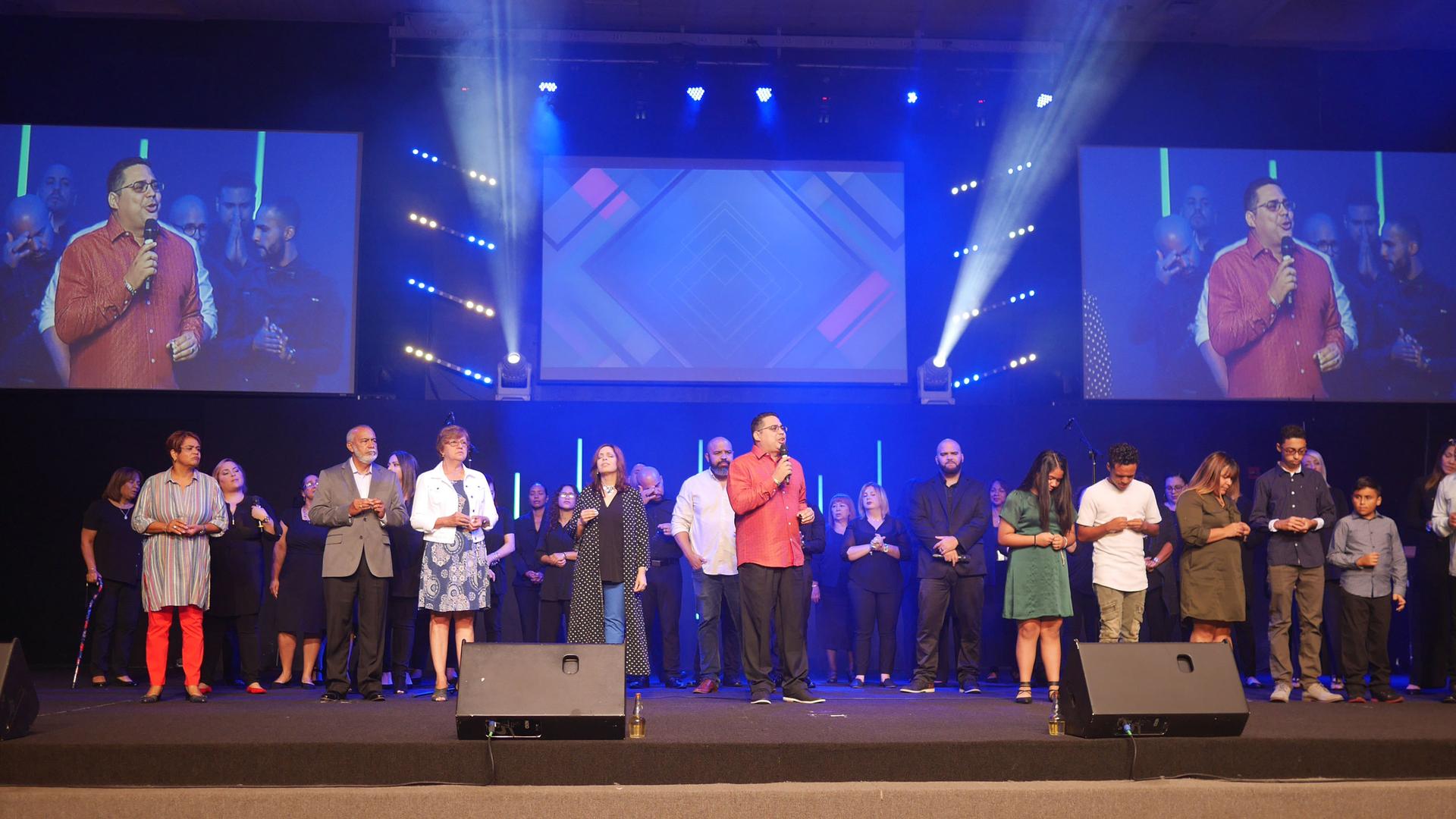This series on evangelical Christianity is a collaboration with the “Sacred Writes” project at Northeastern University and is funded by the Henry Luce Foundation.
When Gabriel Salguero introduces himself to people by name, he reckons that most jump to the same conclusion. They hear his Hispanic surname and figure straightaway: “Oh, he must be a Democrat.”
But when Gabriel Salguero mentions that he’s also an evangelical pastor, he says most people assume just the opposite.
“They’ll be like, ‘Oh … a Republican,’” he said. But Gabriel Salguero is keen to point out that neither assumption is true.
“Guess what, I’m Hispanic and evangelical. Work it out!”
“Guess what, I’m Hispanic and evangelical,” he said. “Work it out!”
As the 2020 presidential campaign heats up, evangelical Christians will be getting more and more attention in the news media. They always do during election season. But people who identify as evangelical or born-again Christians are more than just a voting bloc.
Related: For some Christians, being ‘pro-life’ isn’t just about being against abortion
Evangelicals make up a huge swath of the US population. About 1 in 4 Americans identify as Protestant evangelical, according to the Pew Research Center. In a handful of US states, about half of the population is evangelical.
The broad category of evangelical Protestants includes many different Christian denominations. But if you ask people if they think of themselves as either an evangelical or born-again Christian, around 40% of the US population has consistently identified as such going back to the early 1990s.
The evangelical church as a whole is still about 75% white. But that group is shrinking. In 2007, the Pew Research Center found that more than 80% of evangelicals were white. It’s Latinos who are the fastest-growing group of evangelicals in America, however.
“Evangelicals are not a monolith,” said pastor Jeanette Salguero. She and her husband Gabriel Salguero are two of the pastors — Jeanette Salguero is also the chief operating officer — at Calvario City Church in Orlando, one of the biggest Latino-led megachurches in Florida.
Calvario reflects some of the big shifts happening in American evangelicalism.
At the pulpit, Gabriel Salguero and Jeanette Salguero are a dynamic duo. During a recent Sunday service, they stride back and forth across the stage, pulling the congregation into a sermon based on the Book of Ruth. Gabriel Salguero preaches in Spanish with Jeanette Salguero translating into English and at certain moments, they switch and it’s vice versa.
“In the Bible, there are very few books named after women,” Gabriel Salguero told the congregation. “But it does not mean that women are not important,” he said with gusto, getting approval from his wife, Jeanette Salguero. Then, Gabriel invites the men in attendance to show some enthusiasm for this point not once, but twice.
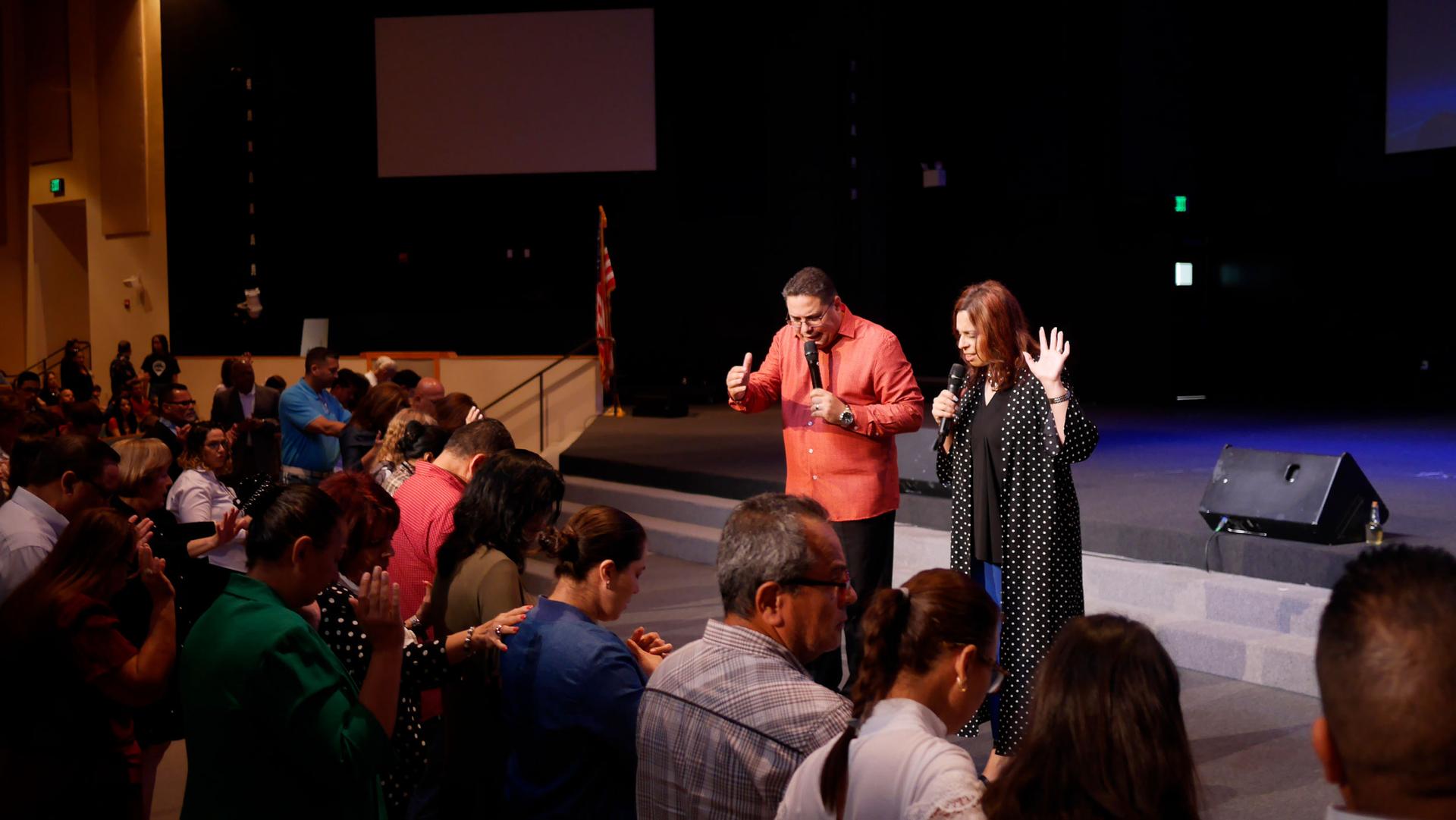
The diversity in the pews at Calvario is striking. The place is mostly full on this Sunday. At capacity, the main worship hall holds around 4,000 congregants. They are white and brown and black, with some people dressed up and others, not so much. A majority of the congregation is Spanish speaking, but Sunday services are in both English and Spanish, with Portuguese and Haitian Creole available in simultaneous translation.
Pastor Gabriel Salguero says evangelicals tend to share a set of common core beliefs.
“They have a high view of scripture. They believe in Christ as the only savior. They believe in eternal life, and evangelical comes from euangelion from the Greek, which is to ‘share the good news,’ he explained in an interview after Sunday service.
“They have a high view of scripture. They believe in Christ as the only savior. They believe in eternal life, and evangelical comes from euangelion from the Greek, which is to ‘share the good news,’ he explained in an interview after Sunday service.
“We’re committed to the gospel of Christ in a way that transforms society,” Gabriel Salguero said.
During his sermon, Gabriel Salguero reminds the congregation that the mission of Calvario City Church is not to build a great church. It’s about building a great city, he says. That is part of the church’s motto. And for the Salgueros, the word “city” has a broad meaning.
Gabriel Salguero has served on a White House advisory council and led prayers at the Democratic National Convention. He and Jeanette Salguero co-founded the National Latino Evangelical Coalition, which represents the fastest-growing group of evangelicals in America.
The couple moved to Orlando from New York City in 2016 and soon after, the community was confronted with tragedy. A shooting attack at a gay nightclub called Pulse took place that summer not far away from Calvario City Church. Nearly all of the 49 people killed in that attack were Hispanic.
When a vigil was held in an Orlando city park, Gabriel Salguero attended the event and led prayers. Afterward, Gabriel Salguero says a young gay man approached him and said: “I watch you on television. What are you doing here?”
Related: After a mass shooting, thoughts and prayers. But then what?
“I said, ‘I’m here because I think Jesus would be here,’” Salguero said. Soon after that, the family of one of the shooting victims asked if Calvario was open to having the funeral service there. And the church opened its doors.
“The challenge in America today is, on very delicate issues, we collapse everything to a simplistic form,” Gabriel Salguero told The World. “We assume that LGBTQ communities don’t have evangelical relatives.”
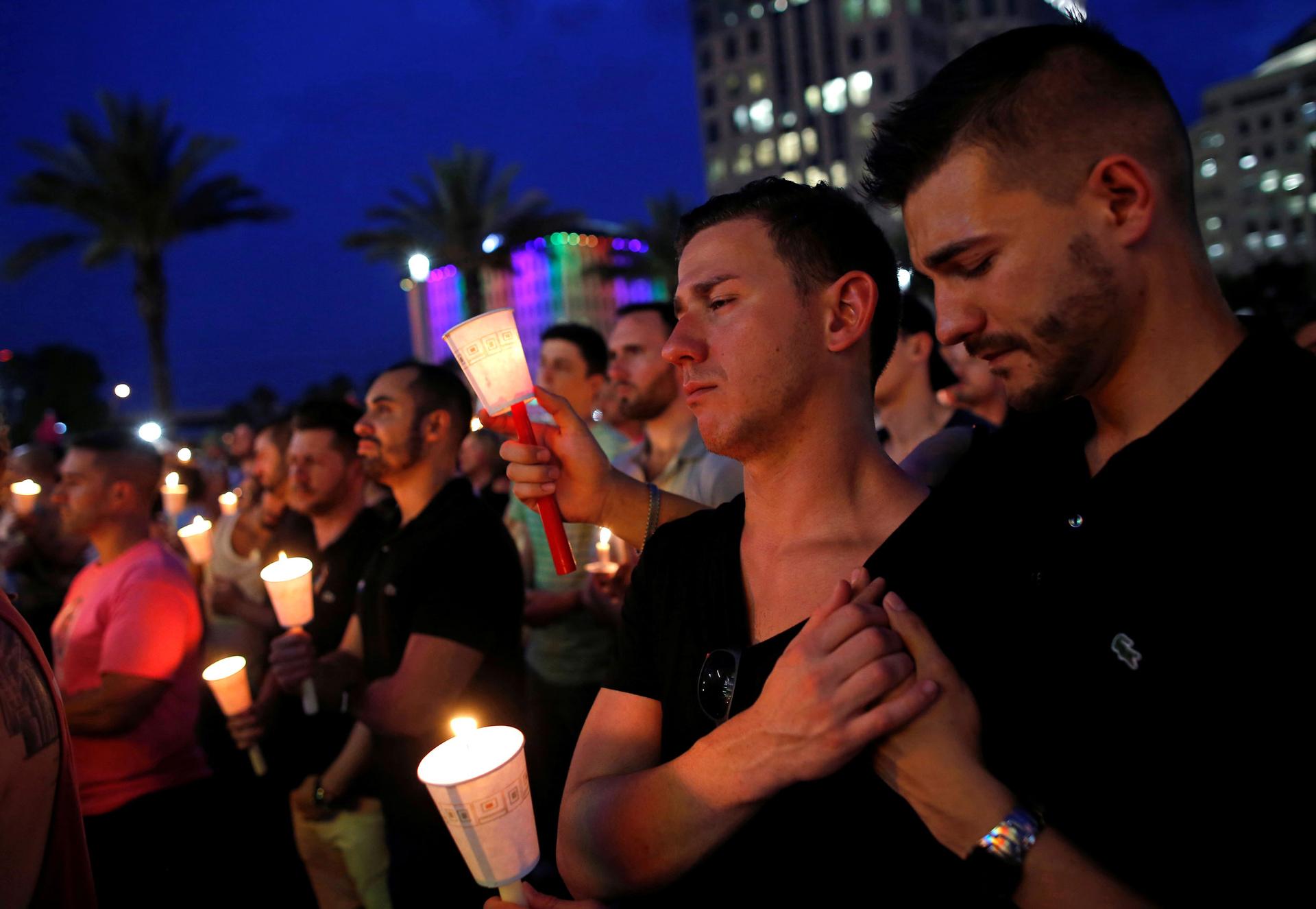
“These conversations are happening all the time. Regrettably, it’s during these crises that they get attention, that finally, people feel that it’s courageous. But people should be courageous every day to have these boundary-crossing conversations.”
“These conversations are happening all the time. Regrettably, it’s during these crises that they get attention, that finally, people feel that it’s courageous. But people should be courageous every day to have these boundary-crossing conversations.”
The Salgueros say that the Bible does not condone homosexuality or gay marriage. That’s a common belief among evangelicals. But Gabriel Salguero says he hopes that Calvario is a place where everyone feels welcome, and where people who disagree with each other can still have conversations.
Jeanette Salguero says the church also makes it a priority to work with immigrants and refugees, even if that’s not a popular move with some conservative evangelicals.
Related: A black church in Boston says it’s called to be a sanctuary
“We do serve a huge refugee community here, and they’re very important to us,” Jeanette Salguero said. “We will serve them as if they are our own. That’s who we are. That’s who I am as a pastor.”
Gabriel Salguero says he worries about the rise of nationalism in America and elsewhere, and he has talked about that from the pulpit. On Memorial Day weekend this year, Pastor Gabriel Salguero asked everyone at Sunday service who served in the US armed forces to stand and be recognized. After the applause died down, he invited anyone who served any other nation’s armed forces to stand up, as well. He points out that the members of Calvario come from 25 different countries.
“Yes, love your country,” he said. “But no country is better than any other country in the sight of God.”
“Christ died for the world,” he added.
Pastors Jeanette Salguero and Gabriel Salguero seem to be standing right across the political fault line in America that divides right from left, Republican from Democrat. Unlike many white evangelicals, the Salgueros are not among those who openly embrace the politics of President Donald Trump. At the same time, they are not exactly political progressives, either.
Gabriel Salguero says people should not make assumptions about the political allegiances of evangelicals at a place like Calvario.
“We have Democrats, Republicans, and independents, like me. I’m not affiliated with any political party. We have a great diversity of political thought.”
“We have Democrats, Republicans, and independents, like me. I’m not affiliated with any political party,” he said. “We have a great diversity of political thought.”
“I think evangelicalism in America has a great diversity of political thought, especially when you begin to dig deeper into racial, cultural diversity in evangelicalism.”
To be clear, Jeanette Salguero and Gabriel Salguero say they don’t shy away from addressing politically controversial subjects as preachers. But one thing they say they don’t do is tell people who to vote for. Partly, this comes from their belief in the separation of church and state. But it’s also because they know their congregation is all over the map politically.
Listen to the story here:
It’s not about ‘sheer numbers’
If Calvario City Church, with its multiethnic congregation, and led by Latino pastors, is an example of how evangelical megachurches are changing, there is a radically different congregation getting attention in San Francisco.
The evangelical founders of We Are Church decided that the megachurch model was not their real calling. From the start, they committed to building a church with no paid clergy, no church buildings, and operated out of people’s homes.
Francis Chan is one of the founders of We Are Church. The well-known pastor has written best-selling books and helped establish a successful megachurch with thousands of members in southern California. But at its height, he left that church in 2010 to help create We Are Church.
Related: The biggest megachurch on Earth and South Korea’s ‘crisis of evangelism’
“I got frustrated at a point, just biblically,” Chan told an audience at Facebook in 2017.
We Are Church has impressed Christians from all over, including outside the US, and they are traveling to San Francisco to learn more from people like Kevin Kim, a founding member and elder at We Are Church.
Kim grew up in Virginia going to church with his Korean-born parents. He says he got serious about being a pastor after college, and he joined a large church in Silicon Valley. But he quit that job to join Chan to start We Are Church.
“The traditional metrics of church success are buildings, butts and bucks.”
“The traditional metrics of church success are buildings, butts and bucks,” Kim said, referring to the expression: “Butts in seats.”
“There’s no place in scripture where God says, ‘You know what I value? Here’s what I value: lots of property, or … sheer numbers.’”
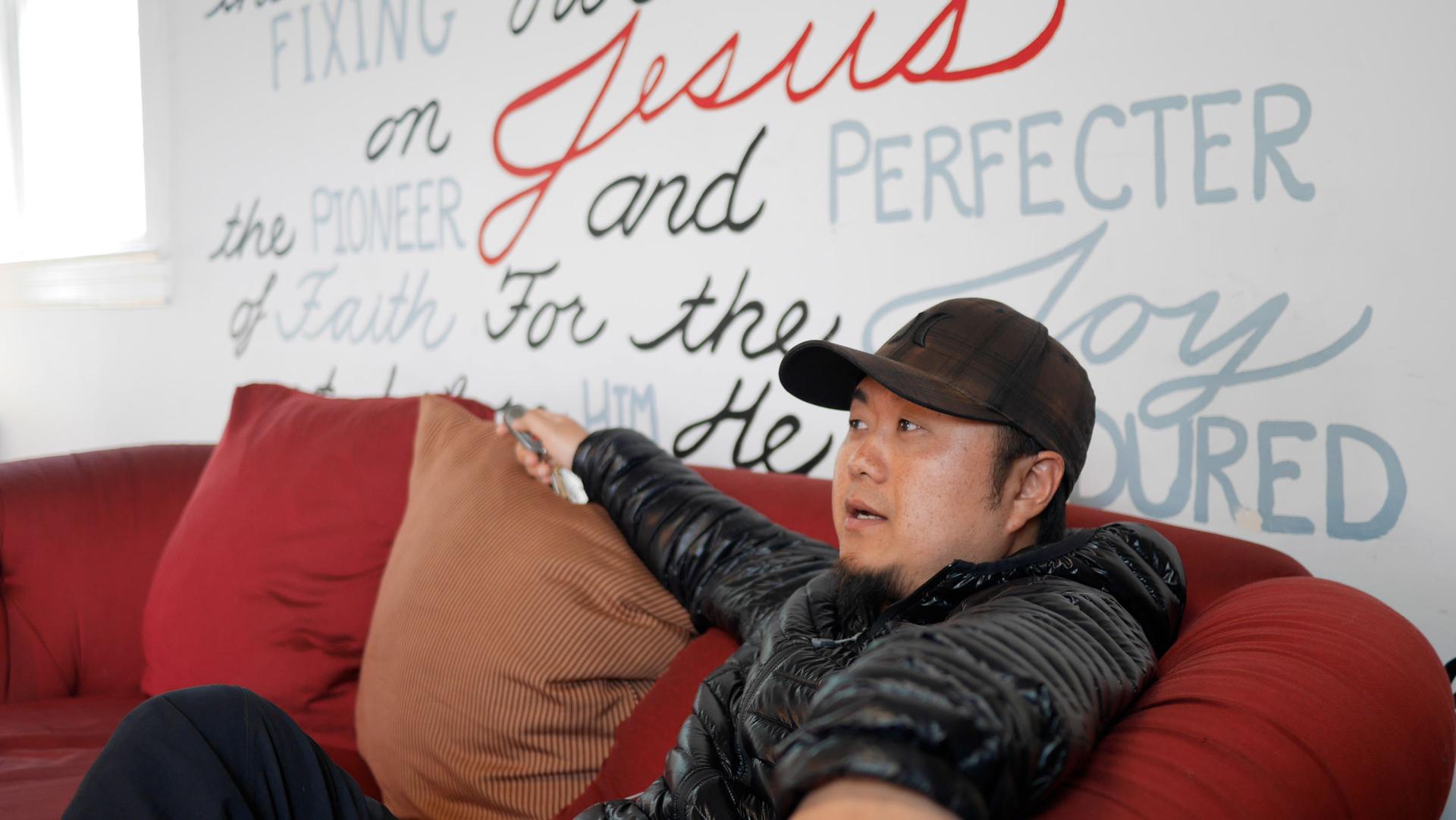
Kim says We Are Church wants to focus on biblical values, and not details like the size of the church membership.
“In your group of 10,000 people, how well do they love one another? And how well do they love the world and their community? And how much do they pray?”
“In your group of 10,000 people, how well do they love one another? And how well do they love the world and their community? And how much do they pray?” Kim said.
“If that’s what God wanted … 10,000 people, then you know what? I can do that. I can get Justin Bieber or Beyoncé to open up, and I can get 10,000 people. That cannot be the metric.”
Here is where the house church model comes in. The members of We Are Church gather in each other’s homes to hold religious services and Bible study. They currently have about 20 house churches, with 10 to 15 adults, each. One of the intentions here is to bring people together, perhaps radically so.
Kim says the group sets out to build house churches whose members might be very different from each other. For example, he says one of them is co-led by a former Mexican gang leader and a Silicon Valley web developer.
“Your ability to be hospitable, your ability to be generous, your ability to love is something that can grow. And it grows better when those things are challenged in really diverse communities across gender experience, race, upbringing, values,” Kim said.
That can make things more difficult, he says. But that is also the point. Kim says the idea here is to prioritize diversity instead of catering to the personal interests of church members. This is one way We Are Church operates as a critique of evangelical megachurches.
The intentions sound well and good, but for some people, it’s asking too much. The role of women in leadership, for example, has been contentious. Kim says that We Are Church does not allow women to become pastors or hold the title of elder. That is based on a conservative reading of scripture that says men and women have different roles.
Some members of We Are Church have quit over this issue. Kim says it’s a tough issue for him because he thinks there are good arguments based on the Bible for and against women serving as pastors. For some, the leadership’s view on gender roles is a deal breaker. But for others who might disagree, the issue is not enough to drive them away from a church that they believe is otherwise living out Christian values, especially in their uncompromising commitment to material generosity.
The unpaid pastors are not the only ones who practice austerity. Church members might also be asked to share resources much more freely than they would at a typical evangelical church. In an expensive city like San Francisco, where people struggle to afford housing, members might even open up their homes to one another.
“We’re not this commune where everybody lives together,” Kim said. “But we are this community where one of our practices is to share our possessions.”
Kim says that helps free up church finances for more important things, like overseas missions and local programs in the city.
Huli Huli Hawaiian Grill is one example of where We Are Church puts its money, time and energy. The look and feel of the place is simple, a few island decorations and the smell of Kalua pork. And there are no obvious signs that the business is really a church ministry.
“Most of our employees here are coming in from difficult situations,” said Kevin Shedden, a church elder who helps run the restaurant. “Homelessness, addiction, jail, rehab.”
The business aims to help employees get some job skills, and revenues go to support other church missions, locally and internationally. All of that might be impossible if We Are Church had a large church building to maintain and multiple pastors on the payroll.
When asked about what it means to be an evangelical today, Shedden — who is a recovering addict himself — says he does not get caught up in the label. People tend to think of evangelicals as white Republicans who support Donald Trump and stand against abortion and same-sex marriage, Shedden says.
“Some of it’s true,” he said. “But I think people aren’t seeing the love for the poor and the marginalized and the oppressed, and Jesus’ desire for justice.”
Shedden says the idea that Christianity is primarily about power or politics is off the mark. He has not bothered to vote, for example, since 2000. And he worries that many of his fellow Christians are getting distracted by politics.
“They’re looking to the Trump or the Obama or the Hillary as the savior. Jesus is the savior,” Shedden said.
In developing a radically different model for what an evangelical church can look like, We Are Church has earned a reputation as a Christian disruptor of sorts. It seems to have a lot of fans. But church elder Kim reminds us that generating buzz is not the real goal.
“It’s not that we’re trying to intentionally pop the status quo for the sake of being contrarian. The goal is the high fidelity to scripture and taking what God says seriously about the church and not just paying lip service to it.”
“It’s not that we’re trying to intentionally pop the status quo for the sake of being contrarian,” Kim said. “The goal is the high fidelity to scripture and taking what God says seriously about the church and not just paying lip service to it.”
Listen to the story here:
‘I don’t like that word’
Another pair of alternative Christian voices spend a lot of their energy talking about faith outside the typical church setting. They regularly discuss the word of God and how it relates to current events on “The Red Couch Podcast with Propaganda and Alma.”
Jason Petty is better known as spoken word artist, and rapper, Propaganda. He says he got the stage name from his cousin. “We were 16 and thought it sounded cool. And it stuck.”
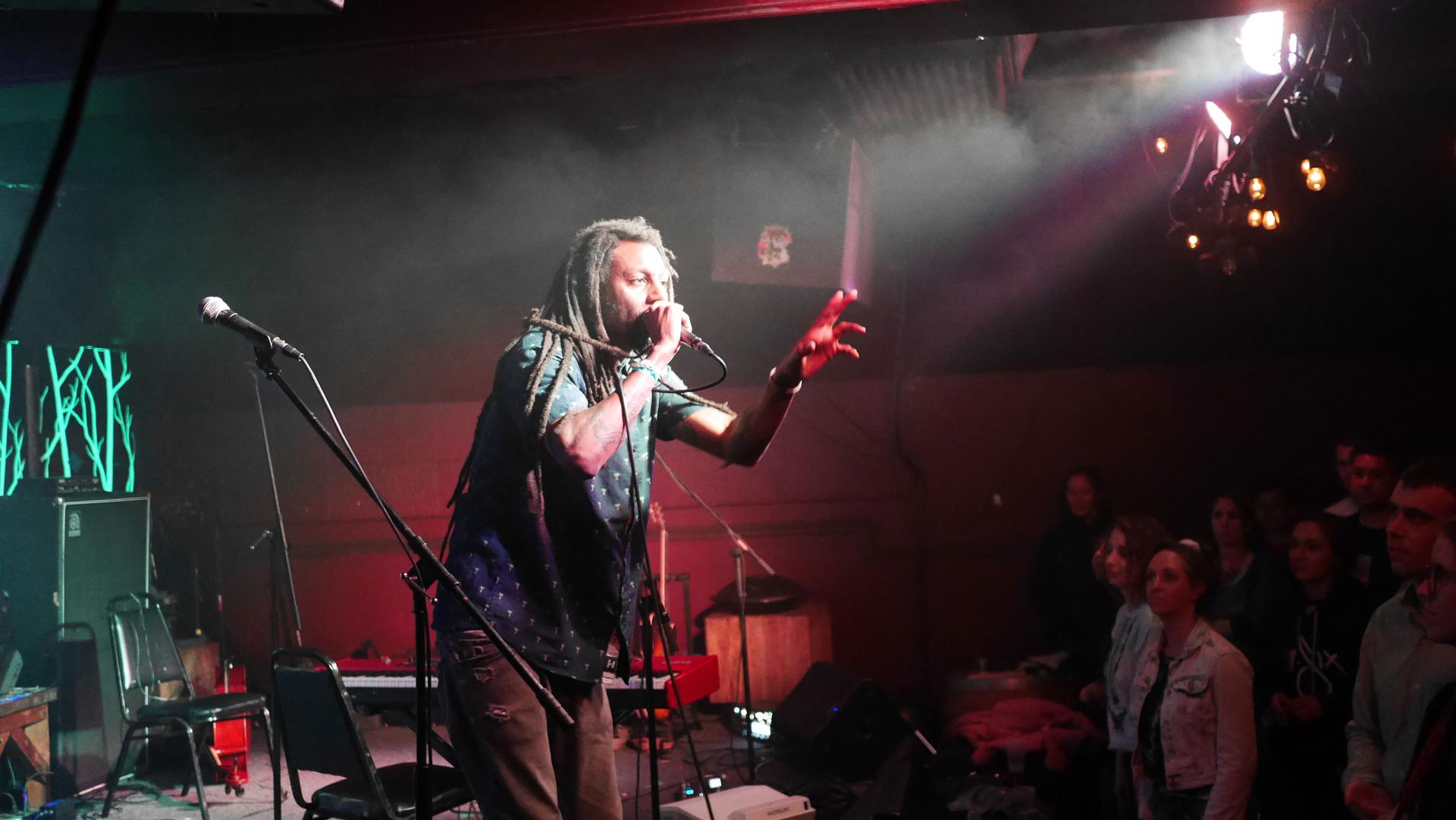
Propaganda grew up in Compton, California, the son of a Black Panther, and he went to a black and Latino Baptist church. He says he always thought of civic engagement as just part of what being a Christian was all about.
“Food banks and homeless shelters … you were already engaged in civic duty because it was necessary for survival,” Propaganda said.
It can make for some real moments of discomfort, he says, when he gets invited to take part in conferences or other public forums with some of his fellow Christian leaders. Propaganda has continued to work with evangelical Christians of all stripes. And people seem to appreciate his take, even if his music points out where he thinks mainstream Christian leaders have failed.
“Why would we listen, when American churches scuff their Toms on our brothers’ dead bodies, as they march to stop gay marriage?” Propaganda raps in Lecrae’s, “Gangland.”
“We had issues with Planned Parenthood, too. We just cared about black lives outside the womb just as much as in.”
In his track, “I Don’t See It,” Propaganda rails against what he sees as suburban complacency.
“Perfectly manicured lawns and them safe schools and parks is a good place to raise a beer belly, right? And them identical strip malls on every corner of your mind can feel a little claustrophobic, right?” he raps. “Don’t you dare close them curtains; it ain’t nighttime.”
Propaganda performed that song at a Christian conference in 2015, at a time when Black Lives Matter protests were gathering steam, and he was frustrated that many of the pastors in attendance seemed more interested in designing their church buildings than working toward peace and justice.
“Cities across the country are in violent protest right now, and you all are sitting around talking about planting churches and whether you should have multisite cameras? That’s what you’re worried about right now?” he remembers thinking at the time.
There are times when he needs to step back, Propaganda says.
“For my own sake of me not snapping at my children, I’m going to keep a distance,” he said.
Today, 1 in 4 American evangelicals is nonwhite, and the fastest-growing group of evangelicals are Latino. But increasingly, many Christians of color are distancing themselves from the label “evangelical” altogether. That is how Alma Zaragoza-Petty feels. She is married to Propaganda and co-hosts “The Red Couch Podcast” with him.
“I don’t like that word,” Zaragoza-Petty said. “I just don’t like terms that label people, but this specific term is also particularly annoying to me. And I don’t like to get associated with it.”
Zaragoza-Petty, an academic in education policy, says she shares certain Christian beliefs with evangelicals, but she does not see herself as one. And that is especially true since white evangelicals voted in such huge numbers — around 81% — for Trump.
“I feel like, evangelical to me seems like a white person, that’s probably Republican, who has very conservative views. That’s what I imagine when I think of the term.”
“I feel like, evangelical to me seems like a white person, that’s probably Republican, who has very conservative views,” she said. “That’s what I imagine when I think of the term.”
Her parents immigrated to the US from Mexico, and Zaragoza-Petty grew up in both countries. Because of her background, she says, sometimes evangelical Christians don’t always see her as fully one of their own.
“They’re like, ‘Oh, that’s cute. You’re a Christian, but you’re a Latina Christian.’ So, it’s different,’” Zaragoza-Petty said. “That’s often how it felt.”
Propaganda and Zaragoza-Petty are probably far from the stereotypical born-again Christian in America. They’re at the margins, in a sense, but so are a lot of Christians, who appreciate that the couple brings their faith into conversations about gender, race and social justice.
“The hope for the podcast is that we can start to center a little more some of the marginalized voices in the Christian community, so that other folks who are like us … can start to see that it’s not just them,” Zaragoza-Petty said.
Sometimes, difficult conversations just don’t happen in the church, she says. But she says they are still needed.
“We have to start engaging with each other,” Zaragoza-Petty said. “Hopefully, in a way that’ll be loving, but also pressing in on some issues that really need to get talked about.”
They might not be pastors at a church, but the podcast — along with Propaganda’s music — offers the couple different opportunities to be Christian leaders with their own type of ministry. In a regular segment on the podcast, they discuss issues in the headlines through a very specific cultural lens. It’s called “Hood politics.”
“We break down politics, basically saying, if you understand gang life, you understand politics,” Zaragoza-Petty said. “Because it’s basically the same thing. It’s just dudes, but they have fancier cars, fancier suits and more money.”
The subject matter of their podcasts can get pretty bleak, and they’re a far cry from some Christian conversations that focus simply on prosperity and positivity. Unlike many evangelicals, Propaganda says he’s not necessarily counting on God to suddenly swoop in and save the world from all of these problems in his lifetime.
So, what gives him hope to keep speaking up?
“History pushes on,” he said. “It’s going to work out because it always does.”
“In the meantime, there are people in front of me that I can reduce their suffering and I can reflect this truth … the narrative that I believe Jesus presented to us. I can reflect that in the world … for the little bit of time I got.”
Listen to the story here:
